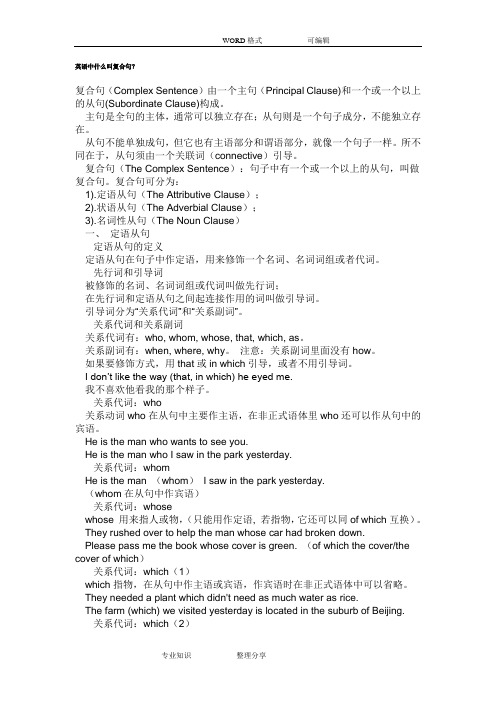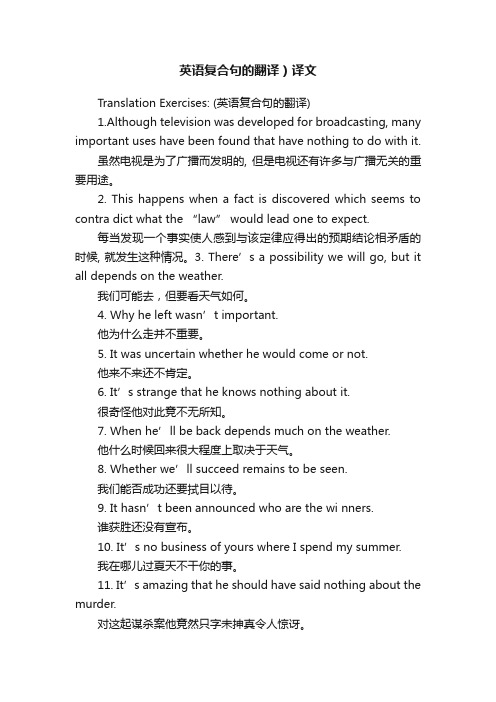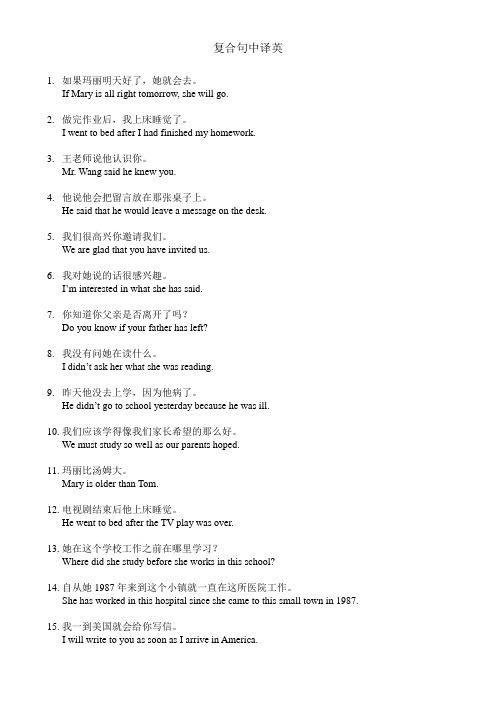复合句的翻译
复合句结构翻译

3.这就是我正在寻找的那本字典。
(that, look for)This is the very dictionary that I’m looking for.定从19.好的鞋、衣服和背包是你去徒步旅行的必需品。
(basic, equipment, need for)Good shoes, clothes and a backpack are the basic equipment you need for your hiking.定从15.我们需要一个有活力的、能够真正地刺激成员更加努力工作的团队领导者。
(who)We need a dynamic team leader who can really motivate the members to work harder.定从20.不管你取得了多么大的进步,你也一定不能骄傲。
(be proud, whatever/ no matter what)You mustn’t be proud whate ver/ no matter what great progress you may have made.定从21.这些就是我们这样做的理由。
(why)These are the reasons why we do so.定从1.我们什么时候举行运动会仍然是个问题。
(when)When we shall have our sports meeting is still a question.主从2.信上说他们将在星期五离开。
(say, that)The letter says that they are leaving on Friday.宾从8.我们现在应该帮助任何需要帮助的人。
(favor, whoever)We should do a favor for whoever needs help at present.宾从10.令她惊讶的是,这个小女孩懂得如此多的事情。
英语中什么叫复合句

英语中什么叫复合句?复合句(Complex Sentence)由一个主句(Principal Clause)和一个或一个以上的从句(Subordinate Clause)构成。
主句是全句的主体,通常可以独立存在;从句则是一个句子成分,不能独立存在。
从句不能单独成句,但它也有主语部分和谓语部分,就像一个句子一样。
所不同在于,从句须由一个关联词(connective)引导。
复合句(The Complex Sentence):句子中有一个或一个以上的从句,叫做复合句。
复合句可分为:1).定语从句(The Attributive Clause);2).状语从句(The Adverbial Clause);3).名词性从句(The Noun Clause)一、定语从句·定语从句的定义定语从句在句子中作定语,用来修饰一个名词、名词词组或者代词。
·先行词和引导词被修饰的名词、名词词组或代词叫做先行词;在先行词和定语从句之间起连接作用的词叫做引导词。
引导词分为“关系代词”和“关系副词”。
·关系代词和关系副词关系代词有:who, whom, whose, that, which, as。
关系副词有:when, where, why。
注意:关系副词里面没有how。
如果要修饰方式,用that或in which引导,或者不用引导词。
I don’t like the way (that, in which) he eyed me.我不喜欢他看我的那个样子。
·关系代词:who关系动词who在从句中主要作主语,在非正式语体里who还可以作从句中的宾语。
He is the man who wants to see you.He is the man who I saw in the park yesterday.·关系代词:whomHe is the man (whom)I saw in the park yesterday.(whom在从句中作宾语)·关系代词:whosewhose 用来指人或物,(只能用作定语, 若指物,它还可以同of which互换)。
英语复合句的翻译)译文

英语复合句的翻译)译文Translation Exercises: (英语复合句的翻译)1.Although television was developed for broadcasting, many important uses have been found that have nothing to do with it.虽然电视是为了广播而发明的, 但是电视还有许多与广播无关的重要用途。
2. This happens when a fact is discovered which seems to contra dict what the “law” would lead one to expect.每当发现一个事实使人感到与该定律应得出的预期结论相矛盾的时候, 就发生这种情况。
3. There’s a possibility we will go, but it all depends on the weather.我们可能去,但要看天气如何。
4. Why he left wasn’t important.他为什么走并不重要。
5. It was uncertain whether he would come or not.他来不来还不肯定。
6. It’s strange that he knows nothing about it.很奇怪他对此竟不无所知。
7. When he’ll be back depends much on the weather.他什么时候回来很大程度上取决于天气。
8. Whether we’ll suc ceed remains to be seen.我们能否成功还要拭目以待。
9. It hasn’t been announced who are the wi nners.谁获胜还没有宣布。
10. It’s no business of yours where I spend my summer.我在哪儿过夏天不干你的事。
复合句例句英语

复合句例句英语在学习英语的过程中,复合句的学习占据了重要的位置,它是语法中重要的一部分,并且能够帮助我们掌握英语的表达能力。
复合句,也叫并列句,是由两个或更多个句子组成,各句子又分别可以分割成主从句。
主从句通过连词将两个句子形成关联,这种连词叫做连接词。
一些常用的连接词有:and(和)、or(或)、but(但)、so(因此)、yet (然而)、nor(也不)等等。
比如:He speaks English fluently, yet he can not write it very well.他英语讲的流利,但写的不怎么样。
复合句的意思比单独的句子要复杂,而且可以表达更深层次的意义,它由单独句子组合而来,而不是由一系列单独句子表达出来的。
复合句也可以是定语句,也就是我们常说的定语从句。
它使主句更具体,也把它们联系在一起。
例如:The boy who lived next door was very friendly.住在隔壁的那个男孩是非常友善的。
复合句也可以是宾语从句。
它是作为一个句子的宾语,它从句的主语和系动词关系密切,陈述它们之间的变化。
例如:He believes that he can do it.他相信他可以做到。
复合句也有状语从句,状语从句一般用来表示状语,用来修饰主句中的动词、形容词或动词短语,用来表示时间、地点、原因、条件、结果等。
例如:He took a walk after he finished his work.他工作完后,就去散步。
复合句还可以是复合宾语,复合宾语是指宾语后跟着一个介词短语,而介词短语也可以作为复合句的一部分,也就是复合宾语从句。
例如:He found time to look after his mother.他找时间照看他母亲。
复合句是扩大句子表达范围的一种手段,它不仅可以表达更丰富的含义,而且能够更有效地表达意思。
它是一种以主从句相结合的语法结构,在写作中可以帮助增加文章的复杂性、内涵性,用来提高文章的层次感。
复合句中译英

复合句中译英1.如果玛丽明天好了,她就会去。
If Mary is all right tomorrow, she will go.2.做完作业后,我上床睡觉了。
I went to bed after I had finished my homework.3.王老师说他认识你。
Mr. Wang said he knew you.4.他说他会把留言放在那张桌子上。
He said that he would leave a message on the desk.5.我们很高兴你邀请我们。
We are glad that you have invited us.6.我对她说的话很感兴趣。
I’m interested in what she has said.7.你知道你父亲是否离开了吗?Do you know if your father has left?8.我没有问她在读什么。
I didn’t ask her what she was reading.9.昨天他没去上学,因为他病了。
He didn’t go to school yesterday because he was ill.10.我们应该学得像我们家长希望的那么好。
We must study so well as our parents hoped.11.玛丽比汤姆大。
Mary is older than Tom.12.电视剧结束后他上床睡觉。
He went to bed after the TV play was over.13.她在这个学校工作之前在哪里学习?Where did she study before she works in this school?14.自从她1987年来到这个小镇就一直在这所医院工作。
She has worked in this hospital since she came to this small town in 1987.15.我一到美国就会给你写信。
复合句-非谓语-翻译

复合句-非谓语-翻译一、名词性从句1.What Sarah said showed that she hadn’t decided whether she should stay or not.Sarah’s words showed that she hadn’t decided whether to stay or not.沙拉的话语显示出她还没决定是否要留下。
2.That prices keep going up worries the public.Prices’ keeping going up worries the public.价格的不断上涨困扰着人们。
3.Would you please show me how I can get to the railway station?Would you please show me how to get to the railway station?你能告诉我到火车站怎么走吗?4.That many people in south China received a heavy attack of natural disaster drew closeattention from all over the world.In south China, many people’s receiving a heavy attack of natural disaster drew close attention from all over the world.在中国南方,许多人遭遇到重大的自然灾害引起了全世界的密切关注。
5.Victor apologized for his not being able to inform me the change in the plan.Victor apologized for that he was not able to inform me the change in the plan.维克托为没能通知我计划有变而道歉。
英语语法。复合句(从句)

2)宾语从句
名词句用作宾语的从句叫宾语从句。引导宾语从句的关联词与引导主语从句表语从句的关联词大致一样,在句中可以作谓语动词或介词及非谓语动词的宾语。
1. 由连接词that引导的宾语从句
同位语:The fact that he has not been seen recently disturbs everyone in his office.
最近谁也没有见过他,这一事实令办公室所有的人不安。
形容词宾语:I am glad that you are satisfied with your job.
The teacher told us that Tom had left us for America.
5. think, believe, imagine, suppose等等动词引起的否定性宾语从句中,要把上述主句中的动词变为否定式。即将从句中的否定形式移到主句中。例如:
We don’t think you are here. 我们认为你不在这。
同位语从句和定语从句的区别:
that作为关系代词,可以引导定语从句,充当句子成分,在从句中作宾语时可以省略;that引导同位语从句时,起连词的作用,没有实际意义,不充当句子成分,一般不能省略。
试比较下面两个例句:
I had no idea that you were here.(that引导同位语从句,不能省略)
I don’t believe he will do so. 我相信他不会这样做。
3)表语从句
在句中作表语的从句叫表语从句。引导表语从句的关联词与引导主语从句的关联词大致一样,表语从句位于联系动词后,有时用as if引导。其基本结构为:主语+ 系动词+ that从句。例如:
复合句结构翻译

3.这就是我正在寻找的那本字典。
(that, look for)This is the very dictionary that I’m looking for.定从19.好的鞋、衣服和背包是你去徒步旅行的必需品。
(basic, equipment, need for)Good shoes, clothes and a backpack are the basic equipment you need for your hiking.定从15.我们需要一个有活力的、能够真正地刺激成员更加努力工作的团队领导者。
(who)We need a dynamic team leader who can really motivate the members to work harder.定从20.不管你取得了多么大的进步,你也一定不能骄傲。
(be proud, whatever/ no matter what)You mustn’t be proud whate ver/ no matter what great progress you may have made.定从21.这些就是我们这样做的理由。
(why)These are the reasons why we do so.定从1.我们什么时候举行运动会仍然是个问题。
(when)When we shall have our sports meeting is still a question.主从2.信上说他们将在星期五离开。
(say, that)The letter says that they are leaving on Friday.宾从8.我们现在应该帮助任何需要帮助的人。
(favor, whoever)We should do a favor for whoever needs help at present.宾从10.令她惊讶的是,这个小女孩懂得如此多的事情。
- 1、下载文档前请自行甄别文档内容的完整性,平台不提供额外的编辑、内容补充、找答案等附加服务。
- 2、"仅部分预览"的文档,不可在线预览部分如存在完整性等问题,可反馈申请退款(可完整预览的文档不适用该条件!)。
- 3、如文档侵犯您的权益,请联系客服反馈,我们会尽快为您处理(人工客服工作时间:9:00-18:30)。
She went back to take care of her husband who was seriously ill.
她回去照顾她的丈夫,他严重地病了。 她回去照料病重的丈夫。
译者不应为翻译而翻译。一切翻译应把准确表达意 思放在首位,能简则简,能直译则直译;其次,灵 活多变地运用各种翻译技巧,帮助再现原文的内容 和风貌。
我估计,尽管场合各有不同,我们中间不止有一两个人曾 经遇到过这样的窘境:想要临时编造一个假地址,可是脑子 却突然不管用了。(让步状语从句提前) No matter how she juggles the figures, she and her husband were wage earners and their savings were al eaten up by the increased prices of everything. 她和丈夫都属于工薪阶层,所以无论她怎样精打细算,他 们的一点储蓄还是被飞涨的物价给蚀空了。 (让步状语从句后置)
The 25-year teaching veteran says he was denied a promotion and pay rise last year because he hadn’t published a sufficient number of research papers.
2.换序法。 英语句子的构成主要靠关联词,不在意时间顺序和 逻辑顺序,汉语则与之相反。所以,英译汉时,常 常需要调整主句和状语从句的语序,以符合汉语的 行文习惯。
I’ll let you know as soon as it is arranged.
一安排好我就通知你。(时间状语从句提前)
F.D.R. became the first president to visit South America when he went to Columbia in 1934. 1934年,罗斯福访问哥伦比亚,成了美国历史上第一个访 问南美的总统。(时间状语从句提前)
有些定语从句中的关系代词并不是指主句中的一个词,而是 指整个主句,一般将其译成“这”或“这一点”。主句的译 本身不是一个分句,而是“这”的同位语。
1.分译法。 1.译出关系代词或关系副词
He has been to Paris, which he thinks is the most beautiful city in the world. 他去过巴黎,他认为巴黎是世界上最美的城市。 The note was left by Mr. Wang, who was here a moment ago. 这张条子是王先生留的,他刚才来过。 We will put off the outing until next week, when we won’t be so busy. 我们把郊游推迟到下星期,那时我们就不会这么忙了。 They will fly to Kunming, where they plan to stay for two or three days, and then go to Guilin. 他们将乘飞机到昆明,在那儿停留两三天,然后去桂林。
I suspect more than a few men have encountered the same dilemma, although different circumstances. Trying to make up an address on the spot, the mind suddenly blanks.
3.译成兼语式的一部分。
I need someone who can instruct me in my English study. 我需要一个人来指导我学英语。 When I passed by, I saw a man who was writing something in the room. 我从这里路过时,看到一个人在屋子里写字。 I have three letters which I must write this afternoon. 我有三封信必须今天下午写出来。
(二)状语从句的翻译 -顺译法、换序法、合译法、转译法
1.顺译法。 一般来说,状语从句的位置刚好符合汉语的叙事顺 序,在这种情况下,就可以直接原文顺序翻译。
武汉位于长江和汉水汇合处。(地点状语从句)
Wuhan lies where the Yangtze and the Han River meet My wife’s mother wanted to marry him before he left for England, but he refused, because he didn’t want her to be so young a widow. 我妻子的母亲想让他在赴英国前就完婚,但他坚持不肯, 因为他不想让她年纪轻轻就成为寡妇。(原因状语从句)
(一)定语从句的翻译-合译法、分译法、转译法
1.合译法。 合译法是把主句和定语从句合译成一个单句的译法, 主要以限制性的定语从句为主。具体做法可以译成 定语(“的”字结构)、谓语、兼语式的一部分或带 有“这”字的单句。
1. 译成定语(“的”字结构). A man who doesn’t try to learn from others cannot hope to achieve much. 一个不向别人学习的人是不能指望有多少成就的。 The few points which the president stressed in his report are very important indeed. 院长在报告中强调的几点的确很重要。
4.译成连动式的一部分。
He took a bottle of wine out of his pocket, which he began to drink slowly. 他从衣兜里掏出一瓶酒慢慢地喝起来。 We’ll send the boy to Britain, where he will receive better education. 我们要把这孩子送到英国接受更好的教育。 The serviceman will send the washing machine to the repair shop, where it will be checked and repaired. 维修工将把这台洗衣机送到维修部检修。 英文中主从句的动词不一样时,可以不译关系代词,直接 把这两个动词连起来翻译,显得句子前后意思更连贯。
5.译成带有“这”字的单句
He admired Mrs. Brown, which suprises me. 他佩服布朗太太,这使我感到惊奇。 They turned a deaf ear to our demands, which enraged all of us. 他们对我们的要求置之不理,这使我们大家都很气愤。 She was very patient towards the children, which her husband seldom was. 她对孩子们很耐心,她丈夫却很少这样。
Although during his three years in Egypt Froster became sufficiently interested in the country to write a guidebook to Alexandria, a pamphlet for the Labor Research Department, and some thirty miscellaneous pieces on Egyptian topics, India was by no means forgotten; indeed, to some extent his experiences of the two countries reinforce each other.
在埃及的那三年,福斯特对这个国家相当感兴趣,写了一 本在亚历山大旅行的指南,一本为劳工编写的小册子,以及 30篇以埃及为主题不同性质的文章。但他却丝毫未曾忘记 印度。在某种程度上,他在这两国的经历的确互相影响并加 深感受。(让步状语从句)
2.译成谓语的一部分。
There are many students in this class who come from big cities. 这个班的许多学生来自大城市。 There are some chemical fuels that are clean and smokeless. 有些化学燃料是洁净无烟的。 There have been good results in the experiments that have given him great encouragement. 实验中的良好结果给了他莫大的鼓舞。
We sent the letter by air mail in order that it might reach them in good time. 这封信我们航空寄去以便他们能及时收到。(目的状语从句 Though he was not personally involved, the war and its misery affected him deeply. 虽然他们没有直接受害,但这场战争及其造成的苦难却对 他产生了很深的影响。(让步状语从句) As long as we don’t lose heart, we’ll find a way to overcome the difficulty. 只要我们不灰心,我们就能找到克服困难的办法。 (条件状语从句) A balloon floats in the air as a boat floats on water. 轻气球浮在空气中,犹如船浮在水上。(方式状语从句)
这位有25年教龄的老教师说,由于他未能发表足够数量的 科研论文,去年没有给他升职加薪。(原因状语从句提前) If a balloon could be made large enough, he speculated, then maybe a nonstop flight could be made to Europe. 他推测,如果能制造一个很大的气球,也许能够中途不停 地飞到欧洲。(如果是作为结果的前提,翻译时要把条件 状语放在前面)
